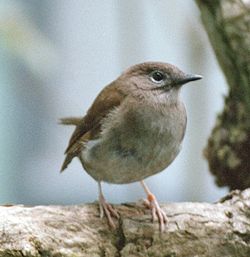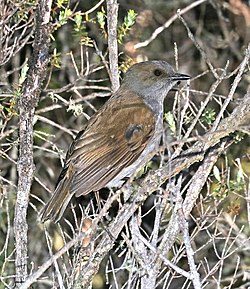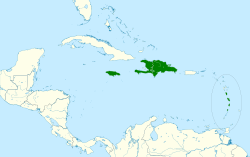| Common name | Scientific name and subspecies | Range | Size and ecology | IUCN status and estimated population |
|---|
| Brown-backed solitaire  | Myadestes occidentalis
Stejneger, 1882 | northwest Mexico to Honduras
 | Size:
Habitat:
Diet: | LC
|
|---|
| Slate-colored solitaire  | Myadestes unicolor
Sclater, PL, 1857 | south Mexico to Nicaragua
 | Size:
Habitat:
Diet: | LC
|
|---|
| Townsend's solitaire  | Myadestes townsendi
(Audubon, 1838) | west Canada to central Mexico
 | Size:
Habitat:
Diet: | LC
|
|---|
| †Kamao  | Myadestes myadestinus
(Stejneger, 1887) | Kauai (Hawaiian Islands, extinct) | Size:
Habitat:
Diet: | EX
|
|---|
| †Amaui
| Myadestes woahensis
(Bloxam, A, 1899) | Oahu (Hawaiian Islands, extinct) | Size:
Habitat:
Diet: | EX
|
|---|
| Puaiohi  | Myadestes palmeri
(Rothschild, 1893) | Kauai (Hawaiian Islands) | Size:
Habitat:
Diet: | CR
|
|---|
| Oloma'o  | Myadestes lanaiensis
(Wilson, SB, 1891) | Hawaiian Islands
 | Size:
Habitat:
Diet: | CR
|
|---|
| ʻŌmaʻo  | Myadestes obscurus
(Gmelin, JF, 1789) | Hawaii (Hawaiian Islands) | Size:
Habitat:
Diet: | NT
|
|---|
| Cuban solitaire  | Myadestes elisabeth
(Lembeye, 1850) | Cuba
 | Size:
Habitat:
Diet: | LC
|
|---|
| Rufous-throated solitaire  | Myadestes genibarbis
Swainson, 1838 | West Indies
 | Size:
Habitat:
Diet: | LC
|
|---|
| Black-faced solitaire  | Myadestes melanops
Salvin, 1865 | Costa Rica and Panama
 | Size:
Habitat:
Diet: | LC
|
|---|
| Varied solitaire  | Myadestes coloratus
Nelson, 1912 | Panama
 | Size:
Habitat:
Diet: | NT
|
|---|
| Andean solitaire  | Myadestes ralloides
(d'Orbigny, 1840) | north Venezuela to west Bolivia
 | Size:
Habitat:
Diet: | LC
|
|---|




















